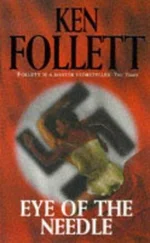Ken Follett - The Key to Rebecca
Здесь есть возможность читать онлайн «Ken Follett - The Key to Rebecca» весь текст электронной книги совершенно бесплатно (целиком полную версию без сокращений). В некоторых случаях можно слушать аудио, скачать через торрент в формате fb2 и присутствует краткое содержание. Жанр: Шпионский детектив, на английском языке. Описание произведения, (предисловие) а так же отзывы посетителей доступны на портале библиотеки ЛибКат.
- Название:The Key to Rebecca
- Автор:
- Жанр:
- Год:неизвестен
- ISBN:нет данных
- Рейтинг книги:4 / 5. Голосов: 1
-
Избранное:Добавить в избранное
- Отзывы:
-
Ваша оценка:
- 80
- 1
- 2
- 3
- 4
- 5
The Key to Rebecca: краткое содержание, описание и аннотация
Предлагаем к чтению аннотацию, описание, краткое содержание или предисловие (зависит от того, что написал сам автор книги «The Key to Rebecca»). Если вы не нашли необходимую информацию о книге — напишите в комментариях, мы постараемся отыскать её.
The Key to Rebecca — читать онлайн бесплатно полную книгу (весь текст) целиком
Ниже представлен текст книги, разбитый по страницам. Система сохранения места последней прочитанной страницы, позволяет с удобством читать онлайн бесплатно книгу «The Key to Rebecca», без необходимости каждый раз заново искать на чём Вы остановились. Поставьте закладку, и сможете в любой момент перейти на страницу, на которой закончили чтение.
Интервал:
Закладка:
“This is Vandam. I think I’m on the trail of your knife man.”
“Jolly good show, sir!” said Newman. “Anything I can do?”
“Well, now, listen. We have to go very softly. For all sorts of reasons which I’ll explain to you later, I’m working entirely on my own, and to go after Wolff with a big squad of armed men would be worse than useless.”
“Understood. What do you need from me?”
“I’ll be arriving in Assyut in a couple of hours. I need a taxi, a large galabiya and a small boy. Will you meet me?”
“Of course, no problem. Are you coming by road?”
“I’ll meet you at the city limits, how’s that?”
“Fine.” Vandam heard a distant chuff-chuff-chuff. “I have to go.”
“I’ll be waiting for you.”
Vandam hung up. He put a five-pound note on the table beside the telephone: a little baksheesh never hurt. He went out into the square. Away to the north he could see the approaching smoke of the train. The younger policeman drove up to him on the bike. Vandam said: “I’m getting on the train. You drive the motorcycle to the next station and meet me there. Okay?”
“Okay, okay!” He was delighted.
Vandam took out a pound note and tore it in half. The young policeman’s eyes widened. Vandam gave him half the note. “You get the other half when you meet me.”
“Okay!”
The train was almost in the station. Vandam ran across the square. The older policeman met him. “The stationmaster is stopping the train.”
Vandam shook his hand. “Thank you. What’s your name?”
“Sergeant Nesbah.”
“I’ll tell them about you in Cairo. Good-bye.” Vandam hurried into the station. He ran south along the platform, away from the train, so that he could board it at the front end without any of the passengers seeing him through the windows.
The train came in, billowing smoke. The stationmaster came along the platform to where Vandam was standing. When the train stopped the stationmaster spoke to the engine driver and the foot plateman. Vandam gave all three of them baksheesh and boarded the train.
He found himself in an economy carriage. Wolff would surely travel first class. He began to walk along the train, picking his way over the people sitting on the floor with their boxes and crates and animals. He noticed that it was mainly women and children on the floor: the slatted wooden seats were occupied by the men with their bottles of beer and their cigarettes. The carriages were unbearably hot and smelly. Some of the women were cooking on makeshift stoves: surely that was dangerous! Vandam almost trod on a tiny baby crawling on the filthy floor. He had a feeling that if he had not avoided the child in the nick of time they would have lynched him.
He passed through three economy carriages, then he was at the door to a first-class coach. He found a guard just outside, sitting on a little wooden stool, drinking tea from a glass. The guard stood up. “Some tea, General?”
“No, thank you.” Vandam had to shout to make himself heard over the noise of the wheels beneath them. “I have to check the papers of all first-class passengers.”
“All in order, all very good,” said the guard, trying to be helpful.
“How many first-class carriages are there?”
“All in order—”
Vandam bent to shout in the man’s ear. “How many first-class coaches?”
The guard held up two fingers.
Vandam nodded and unbent. He looked at the door. Suddenly he was not sure that he had the nerve to go through with this. He thought that Wolff had never got a good look at him—they had fought in the dark, in the alley—but he could not be absolutely sure. The gash on his cheek might have given him away, but it was almost completely covered now by his beard; still he should try to keep that side of his face away from Wolff. Billy was the real problem. Vandam had to warn his son, somehow, to keep quiet and pretend not to recognize his father. There was no way to plan it, that was the trouble. He just had to go in there and think on his feet.
He took a deep breath and opened the door.
Stepping through, he glanced quickly and nervously at the first few seats and did not recognize anyone. He turned his back to the carriage as he closed the door, then turned around again. His gaze swept the rows of seats quickly: no Billy.
He spoke to the passengers nearest him. “Your papers, please, gentlemen.”
“What’s this, Major?” said an Egyptian Army officer, a colonel.
“Routine check, sir,” Vandam replied.
He moved slowly along the aisle, checking people’s papers. By the time he was halfway down the carriage he had studied the passengers well enough to be sure that Wolff, Elene and Billy were not here. He felt he had to finish the pantomime of checking papers before going on to the next coach. He began to wonder whether his guesswork might have gone wrong. Perhaps they weren’t on the train at all; perhaps they weren’t even heading for Assyut; perhaps the atlas clue had been a trick ...
He reached the end of the carriage and passed through the door into the space between the coaches. If Wolff is on the train, I’ll see him now, he thought. If Billy is here—if Billy is here—
He opened the door.
He saw Billy immediately. He felt a pang of distress like a wound. The boy was asleep in his seat, his feet only just reaching the floor, his body slumped sideways, his hair falling over his forehead. His mouth was open, and his jaws were moving slightly: Vandam knew, for he had seen this before, that Billy was grinding his teeth in his sleep.
The woman who had her arm around him, and on whose bosom his head rested, was Elene. Vandam had a disorienting sense of déjâ vu: it reminded him of the night he had come upon Elene kissing Billy good night ...
Elene looked up.
She caught Vandam’s eye. He saw her face begin to change expression: her eyes widening, her mouth coming open for a cry of surprise; and, because he was prepared for something like this, he was very quick to raise a finger to his lips in a hushing sign. She understood immediately, and dropped her eyes; but Wolff had caught her look, and he was turning his head to find out what she had seen.
They were on Vandam’s left, and it was his left cheek which had been cut by Wolff’s knife. Vandam turned around so that his back was to the carriage, then he spoke to the people on the side of the aisle opposite Wolff’s. “Your papers, please.”
He had not reckoned on Billy being asleep.
He had been ready to give the boy a quick sign, as he had done with Elene, and he had hoped that Billy was alert enough to mask his surprise rapidly, as Elene had done. But this was a different situation. If Billy were to wake up and see his father standing there, he would probably give the game away before he had time to collect his thoughts.
Vandam turned to Wolff and said: “Papers, please.”
It was the first time he had seen his enemy face to face. Wolff was a handsome bastard. His big face had strong features: a wide forehead, a hooked nose, even white teeth, a broad jaw. Only around the eyes and the comers of the mouth was there a hint of weakness, of self-indulgence, of depravity. He handed over his papers then looked out of the window, bored. The papers identified him as Alex Wolff, of Villa les Oliviers, Garden City. The man had remarkable nerve.
Vandam said: “Where are you going, sir?”
“Assyut.”
“On business?”
“To visit relations.” The voice was strong and deep, and Vandam would not have noticed the accent if he had not been listening for it.
Vandam said: “Are you people together?”
“That’s my son and his nanny,” Wolff said.
Vandam took Elene’s papers and glanced at them. He wanted to take Wolff by the throat and shake him until his bones rattled. That’s my son and his nanny. You bastard.
Читать дальшеИнтервал:
Закладка:
Похожие книги на «The Key to Rebecca»
Представляем Вашему вниманию похожие книги на «The Key to Rebecca» списком для выбора. Мы отобрали схожую по названию и смыслу литературу в надежде предоставить читателям больше вариантов отыскать новые, интересные, ещё непрочитанные произведения.
Обсуждение, отзывы о книге «The Key to Rebecca» и просто собственные мнения читателей. Оставьте ваши комментарии, напишите, что Вы думаете о произведении, его смысле или главных героях. Укажите что конкретно понравилось, а что нет, и почему Вы так считаете.












